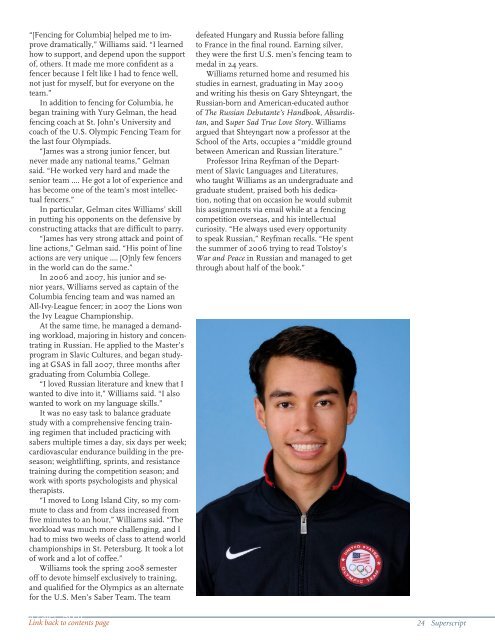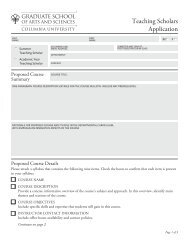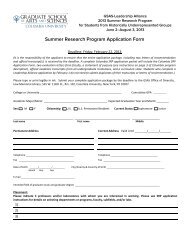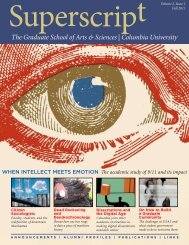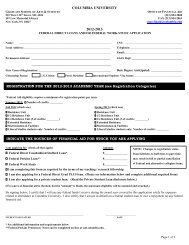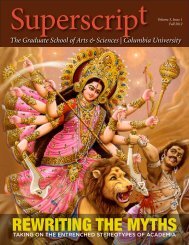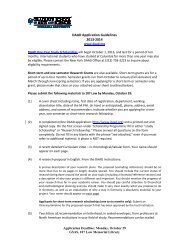PDF for Printing - Graduate School of Arts and Sciences - Columbia ...
PDF for Printing - Graduate School of Arts and Sciences - Columbia ...
PDF for Printing - Graduate School of Arts and Sciences - Columbia ...
- No tags were found...
Create successful ePaper yourself
Turn your PDF publications into a flip-book with our unique Google optimized e-Paper software.
“[Fencing <strong>for</strong> <strong>Columbia</strong>] helped me to improvedramatically,” Williams said. “I learnedhow to support, <strong>and</strong> depend upon the support<strong>of</strong>, others. It made me more confident as afencer because I felt like I had to fence well,not just <strong>for</strong> myself, but <strong>for</strong> everyone on theteam.”In addition to fencing <strong>for</strong> <strong>Columbia</strong>, hebegan training with Yury Gelman, the headfencing coach at St. John’s University <strong>and</strong>coach <strong>of</strong> the U.S. Olympic Fencing Team <strong>for</strong>the last four Olympiads.“James was a strong junior fencer, butnever made any national teams,” Gelmansaid. “He worked very hard <strong>and</strong> made thesenior team …. He got a lot <strong>of</strong> experience <strong>and</strong>has become one <strong>of</strong> the team’s most intellectualfencers.”In particular, Gelman cites Williams’ skillin putting his opponents on the defensive byconstructing attacks that are difficult to parry.“James has very strong attack <strong>and</strong> point <strong>of</strong>line actions,” Gelman said. “His point <strong>of</strong> lineactions are very unique .… [O]nly few fencersin the world can do the same.”In 2006 <strong>and</strong> 2007, his junior <strong>and</strong> senioryears, Williams served as captain <strong>of</strong> the<strong>Columbia</strong> fencing team <strong>and</strong> was named anAll-Ivy-League fencer; in 2007 the Lions wonthe Ivy League Championship.At the same time, he managed a dem<strong>and</strong>ingworkload, majoring in history <strong>and</strong> concentratingin Russian. He applied to the Master’sprogram in Slavic Cultures, <strong>and</strong> began studyingat GSAS in fall 2007, three months aftergraduating from <strong>Columbia</strong> College.“I loved Russian literature <strong>and</strong> knew that Iwanted to dive into it,” Williams said. “I alsowanted to work on my language skills.”It was no easy task to balance graduatestudy with a comprehensive fencing trainingregimen that included practicing withsabers multiple times a day, six days per week;cardiovascular endurance building in the preseason;weightlifting, sprints, <strong>and</strong> resistancetraining during the competition season; <strong>and</strong>work with sports psychologists <strong>and</strong> physicaltherapists.“I moved to Long Isl<strong>and</strong> City, so my commuteto class <strong>and</strong> from class increased fromfive minutes to an hour,” Williams said. “Theworkload was much more challenging, <strong>and</strong> Ihad to miss two weeks <strong>of</strong> class to attend worldchampionships in St. Petersburg. It took a lot<strong>of</strong> work <strong>and</strong> a lot <strong>of</strong> c<strong>of</strong>fee.”Williams took the spring 2008 semester<strong>of</strong>f to devote himself exclusively to training,<strong>and</strong> qualified <strong>for</strong> the Olympics as an alternate<strong>for</strong> the U.S. Men’s Saber Team. The teamdefeated Hungary <strong>and</strong> Russia be<strong>for</strong>e fallingto France in the final round. Earning silver,they were the first U.S. men’s fencing team tomedal in 24 years.Williams returned home <strong>and</strong> resumed hisstudies in earnest, graduating in May 2009<strong>and</strong> writing his thesis on Gary Shteyngart, theRussian-born <strong>and</strong> American-educated author<strong>of</strong> The Russian Debutante’s H<strong>and</strong>book, Absurdistan,<strong>and</strong> Super Sad True Love Story. Williamsargued that Shteyngart now a pr<strong>of</strong>essor at the<strong>School</strong> <strong>of</strong> the <strong>Arts</strong>, occupies a “middle groundbetween American <strong>and</strong> Russian literature.”Pr<strong>of</strong>essor Irina Reyfman <strong>of</strong> the Department<strong>of</strong> Slavic Languages <strong>and</strong> Literatures,who taught Williams as an undergraduate <strong>and</strong>graduate student, praised both his dedication,noting that on occasion he would submithis assignments via email while at a fencingcompetition overseas, <strong>and</strong> his intellectualcuriosity. “He always used every opportunityto speak Russian,” Reyfman recalls. “He spentthe summer <strong>of</strong> 2006 trying to read Tolstoy’sWar <strong>and</strong> Peace in Russian <strong>and</strong> managed to getthrough about half <strong>of</strong> the book.”Laura Paler, AcehLink back to contents page24 Superscript


